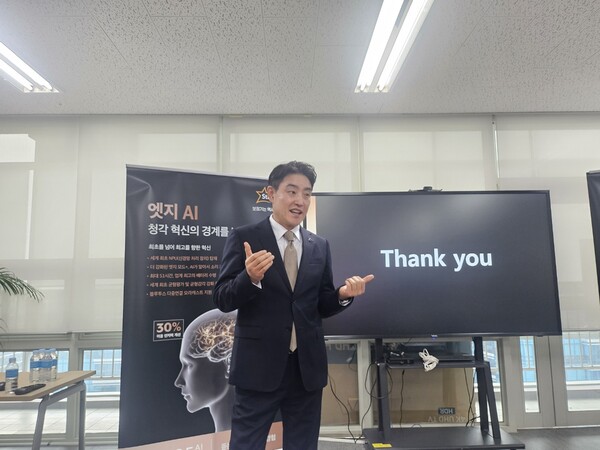“In February last year, Starkey Korea launched Genesis AI, ushering in the era of AI-powered hearing aids in Korea. Following this momentum, we have just launched Edge AI to lead the domestic AI hearing aid market.”
Yoon Kee-hwan, CEO of Starkey Korea, said this at a recent meeting with medical device journalists, explaining the company's business plans and goals for this year.

Yoon added that, unlike its competitors, Starkey Korea has registered its mainstay AI hearing aid, Genesis AI, as a government-supported hearing aid, emphasizing that the company is focusing on expanding the market for AI hearing aids. Starkey Korea added Genesis AI to the list of government-supported hearing aids this year, following Evolv AI in 2024, and plans to maintain their registration next year.
Yoon explained that the company chose to register Genesis AI, which is one year old, because “it gives us confidence in our AI technology and the ability to continue to introduce new products that are more advanced,” as opposed to the usual practice of hearing aid companies registering products that are four to five years old for government coverage.
“Starkey is widely known for its customizable hearing aids, but in recent years, we've been collaborating with leading U.S. AI companies Google, Intel, and Apple to bring the most advanced AI technology to hearing aids to drive the future of hearing aids,” Yoon said, citing the new Edge AI launched in January as an example.
According to Starkey Korea, Edge A incorporates Neuro Sound Technology 2.0, which mimics the way the human brain processes complex sounds and is advanced to dramatically improve signal-to-noise ratio (SNR) in challenging listening situations such as multi-talker babble noise, making it easier for users to understand conversations.
In addition, it enables clearer speech and more comfortable listening in ever-changing listening environments. The AI performs optimal hearing aid adjustments in the form of comfort listening, speech enhancement, and noise reduction to match the user's listening intent. By doing so, Edge AI is said to recognize speech 30 percent more accurately even in noisy environments.
Other strengths that Starkey Korea cites as differentiating Edge AI and other products from the competition are its industry-leading battery life (up to 51 hours for receiver-in-canal (RIC) models and up to 42 hours for in-the-canal (ITC) models) and the world's first balance assessment and rehabilitation using sensors on hearing aids. Notably, AI-powered balance assistance is particularly beneficial for users at high risk of falling, helping them take preventive action via an app.
“Under the slogan 'Hear Better, Live Better,' Starkey aims to enhance users' quality of life by integrating advanced, user-friendly features into its hearing aids,” Yoon said. “We are also continuously investing in R&D to the extent that we release new products yearly.”
Yoon emphasized that Starkey Korea's policy is to make the latest AI technology more affordable for Korean hearing aid users based on this technology. He noted that Genesis AI has been registered as a government-supported hearing aid.
“Genesis AI has been recognized globally for its innovation since its launch,” Yoon said, explaining that it is powered by Starkey's S1 Processor and Neuro Sound Technology 1.0, which automatically makes 80 million acoustic adjustments per hour.
“Genesis AI streamlines its technology tiers from four to three, enhancing accessibility compared to Evolv AI. We also increased user confidence by offering a two-year warranty on all Genesis AI models, compared to Evolv AI’s one- to two-year coverage,” he said. “These changes are part of Starkey's commitment to providing more consistent and reliable service to users of government-funded hearing aids.”
Yoon, who joined Starkey Korea last August, said he hopes to continue the company's growth momentum in 2024 while also focusing on training hearing aid centers and distributors.
“In 2024, we increased our market share by surpassing our sales target by 5.9 percent and achieving over 10 percent year-on-year growth,” Yoon said. “We plan to continue this growth this year and strive to achieve an overall market share of 22 percent and a covered device market share of 35 percent.”
“The domestic hearing aid industry is a win-win market for companies, centers, and distributors,” he said. “As a leading hearing aid company, we will improve the industry's quality through hearing testing and fitting education.”
Related articles
- Korean researchers confirm ‘brain auditory center’s recovery’ after cochlear implantation for 1st time worldwide
- Severe hearing loss in teens, young adults often linked to enlarged vestibular aqueduct
- Korean researchers present new guideline on cochlear implant surgery in infants
- ‘Sudden deafness’ is rising; expert advises treatment within 7 days
- YG donates ₩100 million to help kids with cochlear implants listen to K-pop

